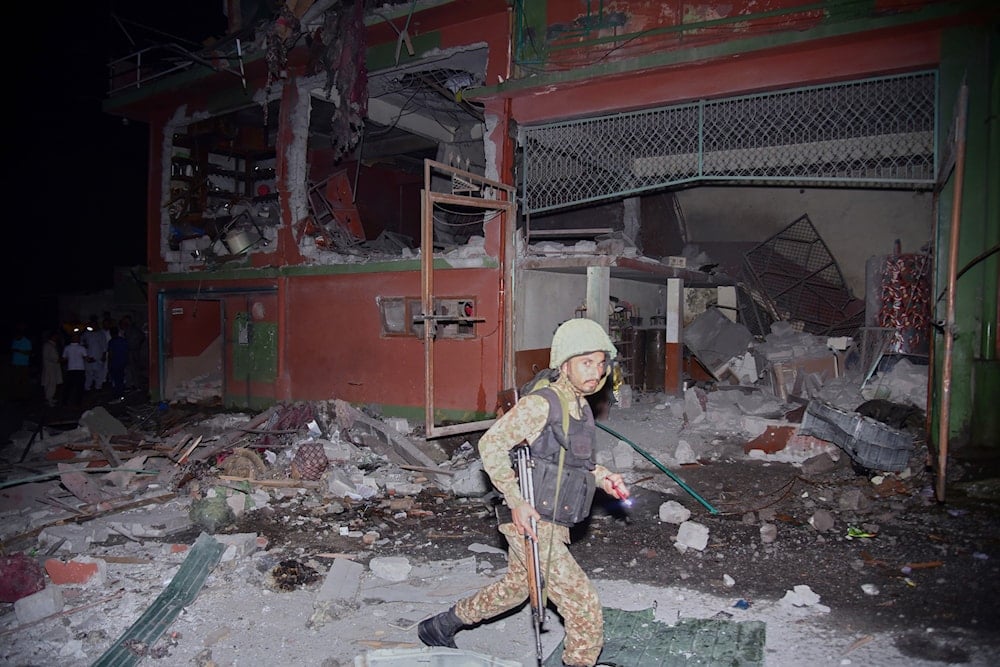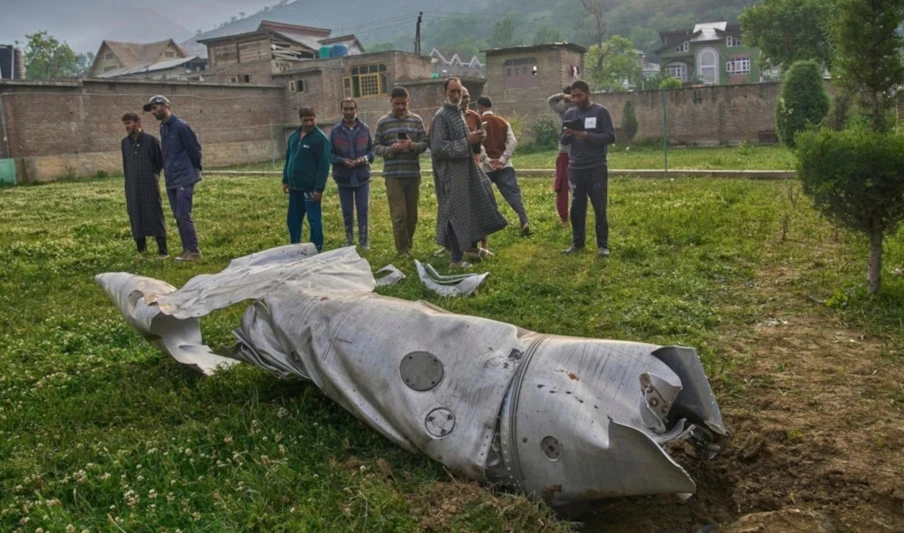India-Pakistan escalation: Water flow cut, strikes kill dozens
India halts water flow to Pakistan and launches airstrikes against the latter, escalating the military standoff between the two nuclear-armed neighbors.
-

A Pakistani army soldier examines a building damaged by a suspected Indian missile attack near Muzaffarabad, the capital of Pakistan-controlled Kashmir, on Wednesday, May 7, 2025. (AP)
India announced it would halt the flow of water across international borders following a deadly attack in Indian-administered Kashmir, with Prime Minister Narendra Modi declaring that the country’s water would be conserved and used solely for national benefit.
Although PM Modi did not directly name Pakistan, the move came two weeks after New Delhi suspended its water-sharing agreement with Islamabad.
The 1960 Indus Waters Treaty, which governs the allocation of six rivers between India and Pakistan, has withstood decades of hostilities, including two wars, and has long been regarded as one of the few enduring examples of successful transboundary water cooperation.
Cross-border strikes intensify along the Line of Control
In response to what New Delhi described as a terrorist attack, India launched missile strikes targeting camps it claimed were used by militants, prompting heavy artillery exchanges along the Line of Control, the disputed de facto border in Kashmir. Observers described the exchanges as the most severe military escalation between the two countries in two decades.
Casualty figures remain disputed, as Islamabad reported 26 civilian deaths caused by Indian strikes and cross-border shelling, while New Delhi claimed eight fatalities from Pakistani artillery fire, bringing the total reported death toll to at least 36.
Indian Air Force officer Vyomika Singh said nine camps were successfully destroyed, with Indian authorities stating the strikes were carefully calibrated to avoid broadening the conflict.
Pakistan’s Defence Minister Khawaja Muhammad Asif accused Modi’s government of using the strikes to boost domestic political standing, asserting that Pakistan had already retaliated and warning, "We won't take long to settle the score."
Pakistani military spokesperson Ahmed Sharif Chaudhry told reporters in Islamabad that five Indian jets had been downed, including three French-made Rafale fighters, while a senior Indian security source reported that three Indian aircraft had crashed within Indian territory.
According to the Pakistani military, 21 civilians were killed in the strikes, with five more dying from border gunfire. Among the victims were four children, including two three-year-old girls.
In Muzaffarabad, the administrative capital of Pakistan-controlled Kashmir, security forces blocked off streets around a mosque reportedly hit during the strikes, and AFP journalists confirmed visible blast damage to nearby residential buildings.
India accused Pakistani forces of initiating unprovoked and indiscriminate shelling across the Line of Control, and AFP journalists on the ground observed explosions lighting up the night sky over the contested area.
A survivor in the town of Poonch named Farooq told Press Trust of India that he and others awoke to the sound of shelling, which left two people wounded, while local revenue officer Azhar Majid reported that at least eight Indians were killed and 29 injured in the attacks.
Michael Kugelman, a US-based analyst, told AFP that the scale of India’s strike and Pakistan’s counter-response both exceeded the levels seen during their 2019 confrontation.
International calls for de-escalation
Diplomatic voices around the world have urged calm, with the spokesperson for UN Secretary-General Antonio Guterres, Stephane Dujarric, warning that full-scale conflict between India and Pakistan could have devastating global consequences.
US President Donald Trump expressed optimism that the confrontation would "end very soon," while Secretary of State Marco Rubio said he was in contact with senior officials in both New Delhi and Islamabad and was monitoring the situation closely.
Iranian Foreign Minister Abbas Araghchi, who visited Islamabad earlier in the week, is scheduled to arrive in New Delhi as part of Tehran’s efforts to mediate between the two sides.
In the aftermath of the strikes, Pakistan’s Ministry of Foreign Affairs summoned the Indian charge d'affaires in Islamabad to register a formal protest, condemning what it called unprovoked Indian military aggression and reaffirming its position on defending Pakistan and Azad Jammu and Kashmir.

 4 Min Read
4 Min Read









